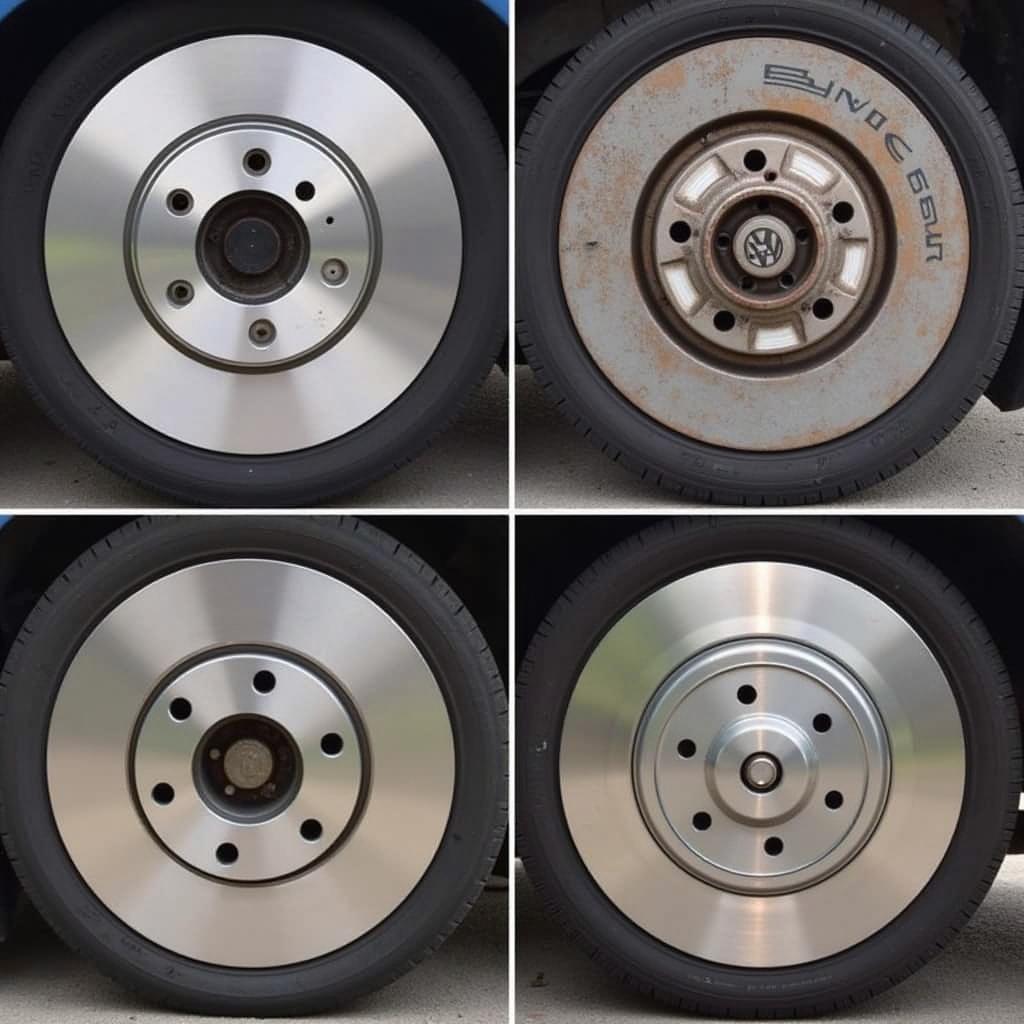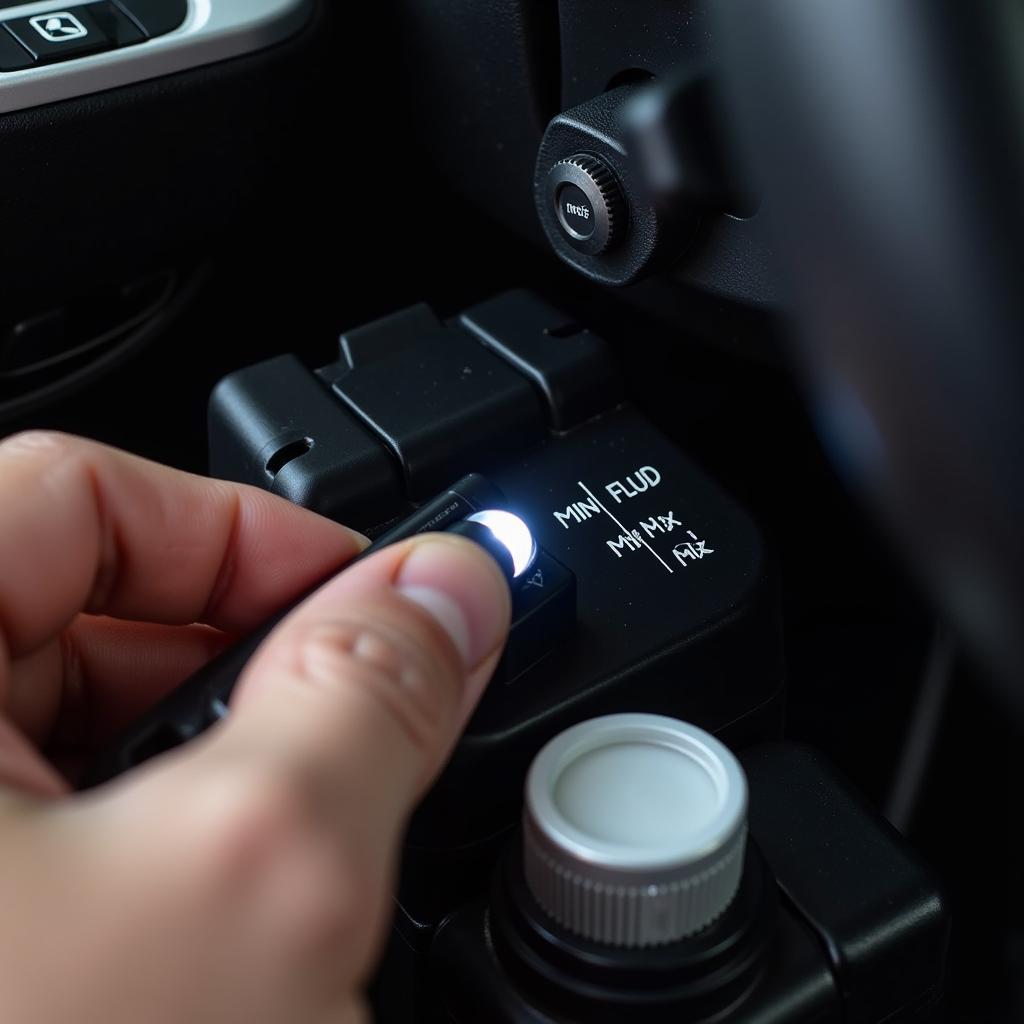Seeing a persistent brake warning light on your VW Golf’s dashboard can be a nerve-wracking experience. This crucial signal is your car’s way of saying something might be amiss with the braking system. While it could be something minor, ignoring it can jeopardize your safety and potentially lead to costly repairs down the line. Don’t panic; this guide is here to help you navigate the possible causes and solutions for a VW Golf brake warning light that won’t turn off.
Understanding Your VW Golf’s Brake Warning Light System
Your VW Golf employs a sophisticated sensor network to monitor the health of your braking system. When the brake warning light illuminates, it’s signaling a potential problem detected by these sensors.
Here’s a breakdown of the common triggers:
- Low Brake Fluid: This is one of the most frequent culprits. The sensors constantly track the brake fluid level, and if it dips below a safe threshold, the warning light activates.
- Worn Brake Pads: Your brake pads have wear indicators designed to rub against the rotor when they become too thin. This rubbing creates a high-pitched squealing sound, and the warning light will often accompany it.
- Faulty Brake Light Switch: Your brake lights and brake warning light system are often connected. If the switch malfunctioning, it can trigger both the brake lights to stay on constantly and the warning light to illuminate.
- ABS Issue: If your Anti-lock Braking System (ABS) experiences a malfunction, a separate warning light might illuminate alongside the brake warning light. This usually indicates a problem with the ABS module or wheel speed sensors.
Troubleshooting the Persistent Brake Warning Light
Before heading to the mechanic, here are some initial checks you can perform yourself:
-
Check Your Brake Fluid: Park your car on a level surface and open the hood. Locate the brake fluid reservoir (refer to your owner’s manual if needed) and visually inspect the fluid level. It should be between the “Min” and “Max” markings. If it’s low, it’s crucial to add the correct type of brake fluid specified in your owner’s manual.
-
Inspect Your Brake Pads: While checking the brake fluid, take a moment to visually inspect your brake pads through the spaces between the wheel spokes. If you have less than ¼ inch of brake pad material remaining, it’s time for a replacement.
 Worn Brake Pads on a VW Golf
Worn Brake Pads on a VW Golf
- Test Your Brake Lights: Have a friend or family member press the brake pedal while you stand behind the car. Ensure all brake lights, including the high-mounted brake light, are functioning correctly.
When to Seek Professional Help
If the brake warning light remains illuminated even after performing these checks, it’s essential to consult a qualified mechanic specializing in VW vehicles. Issues like faulty brake lines, a malfunctioning ABS module, or problems with the electronic parking brake often require specialized diagnostic equipment and expertise to repair.
Remote Diagnostics and Software Solutions
In today’s technologically advanced automotive landscape, many brake-related issues can often be diagnosed and even repaired remotely. Advanced diagnostic software can interface with your VW Golf’s onboard computer, reading error codes and providing valuable insights into the root cause of the warning light. In some instances, software updates or recalibrations can be performed remotely, resolving the issue without needing a physical visit to the workshop.
vw golf check brake pads warning
FAQs about VW Golf Brake Warning Lights
Q: Can I drive my VW Golf with the brake warning light on?
A: While it’s technically possible to drive a short distance with the brake warning light on, it’s highly discouraged. Driving with a compromised braking system puts you and others at risk.
Q: How much does it cost to fix a brake warning light on a VW Golf?
A: The cost can vary significantly depending on the underlying cause. Simple fixes like topping off brake fluid or replacing a brake light switch might cost under $100. More complex repairs involving ABS modules or brake line replacements can range from several hundred to over a thousand dollars.
Q: How often should I check my VW Golf’s brake fluid?
A: It’s a good practice to check your brake fluid level at least once a month and more frequently if you notice any changes in brake pedal feel or responsiveness.
Q: Can I use any brake fluid in my VW Golf?
A: No, using the incorrect type of brake fluid can damage your braking system. Always refer to your owner’s manual for the recommended brake fluid specification.
Q: Why is my VW Golf’s brake warning light flashing?
A: A flashing brake warning light usually indicates a more serious issue, potentially with the ABS system or electronic parking brake. It’s crucial to have your vehicle inspected by a qualified mechanic immediately.
Taking Action for Your Safety
A persistent brake warning light in your VW Golf should never be ignored. By following the troubleshooting steps outlined in this guide and seeking professional help when necessary, you can ensure your safety and keep your VW Golf running smoothly for miles to come. Remember, when it comes to brakes, a proactive approach is always the safest course of action.

